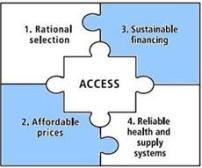Access
 Almost 2 billion people – one-third of the global population – do not have regular access to essential medicines. In some of the lowest-income countries in Africa and Asia, more than half of the populations have no regular access to essential medicines. In developing countries, where an estimated 42 million people are infected with HIV/AIDS, life-saving antiretroviral medicines (ARVs) are available to only 300 000 of the 5–6 million people currently in need of treatment – a crisis that WHO has declared to be a global health emergency.
Almost 2 billion people – one-third of the global population – do not have regular access to essential medicines. In some of the lowest-income countries in Africa and Asia, more than half of the populations have no regular access to essential medicines. In developing countries, where an estimated 42 million people are infected with HIV/AIDS, life-saving antiretroviral medicines (ARVs) are available to only 300 000 of the 5–6 million people currently in need of treatment – a crisis that WHO has declared to be a global health emergency.
Millennium Development Goals
Access to essential medicines is one of the UN’s Millennium Development Goals. Scaling up access to essential medicines is critical to global efforts by WHO to prevent millions of deaths a year, reduce suffering and help reduce the economic burden of illness on the poorest families. WHO estimates that over 10.5 million lives a year could be saved by 2015 – also boosting economic growth and social development – by scaling up existing interventions for infectious diseases, maternal and child health and noncommunicable diseases. Most of these interventions depend on essential medicines.
WHO's four-part framework
WHO has formulated a four-part framework to guide and coordinate collective action on access to essential medicines. This framework, adopted by WHO’s key partners, comprises rational selection; affordable prices; sustainable financing; and reliable health and supply systems.


